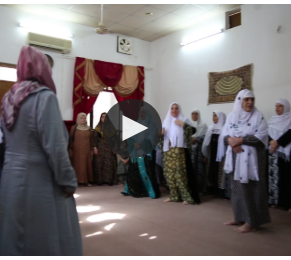The short film clips in this collection detail one day of devotion within the Talabani Tekiye. They show an Islam of love, individualism, and exploration. Over time, interviews, transcripts, poems, translations, manuscript pages, and still images will be added to this collection.
Watch the videos
Background
In the early 19th century, Mullah Mahmood Talabani revived Qadiri Sufism in Kirkuk. Abdul-Qadir Gilani articulated Qadiri Sufism in the 11th century, but after that time it experienced a slow decline. Under the guidance of Mullah Mahmood and his sons, the order became once more a predominant religious presence in Mesopotamia and the Persian and Ottoman Empires. The Talabani sheikhs created not only mosques, but tekiyes: places for peripatetic scholars to rest, study, and exchange knowledge. In the 19th century, the Talabani tekiyes provided space for liberal, some might say heretical, thought.
This legacy lives on today. As the Islamic State stages terrorist attacks within Kirkuk and wages more traditional warfare on the city’s borders, the Talabani Tekiye works for peace. The tekiye’s leaders express clear values: pursue wisdom, honor others to honor God, seek, serve, learn, be generous, be kind. Men and women are equal and both serve as mullahs. Children choose their spiritual path; they are not indoctrinated. Adults affectionately send little ones home saying, “Go read a book.” Mullahs weave all the languages of Kirkuk into worship, including Arabic, Kurdish, Turkish, Turcoman, and Farsi. These ideals stand in stark contrast to those of the Islamic State, hungering for power under its black flag, not 20 kilometers away.
Sheikh Yusuf, the current spiritual leader of the tekiye, acknowledges the difficulty he faces in helping his followers combat the fundamentalist mentality. “Islamic radicals screw our minds. Anyone who holds truth doesn’t torture people with it. What’s wrong Islam? That which pits its believers against all else.” In welcoming Kashkul researchers to the tekiye to record its worship, Sheikh Yusuf demonstrated a progressive mindset. He explained to me, “You, a stranger, a woman of a different religion, come here to me. Some criticize me, ‘How can you let her in here?’ But the truth is that you and I deal in creation, God’s creation. I confront you as a diamond of God. You, a stranger, came through the invitation of Sheikh Pirot, but the purpose of your visit is knowledge.” In pursuit of understanding, Sheikh Pirot, Sheikh Yusuf and his wife, Sheikha Sunbul, allowed our team to document the worship of both men and women.
--Alana Marie Levinson-LaBrosse


